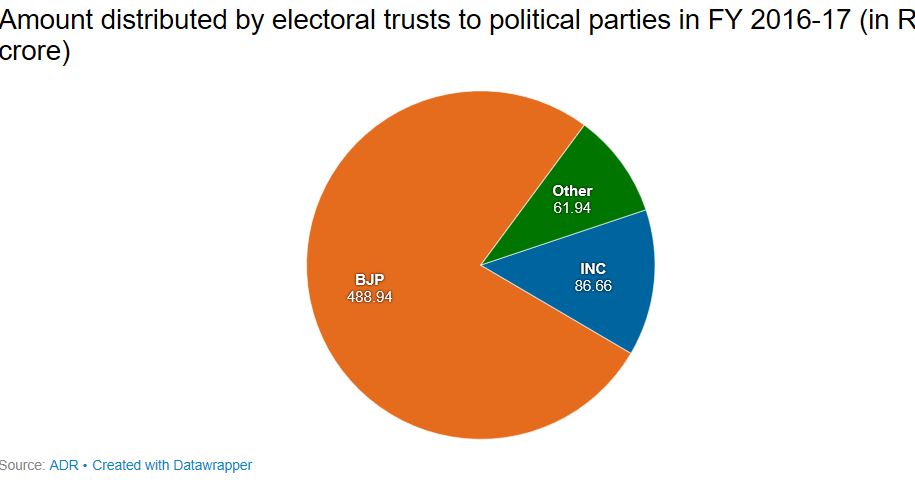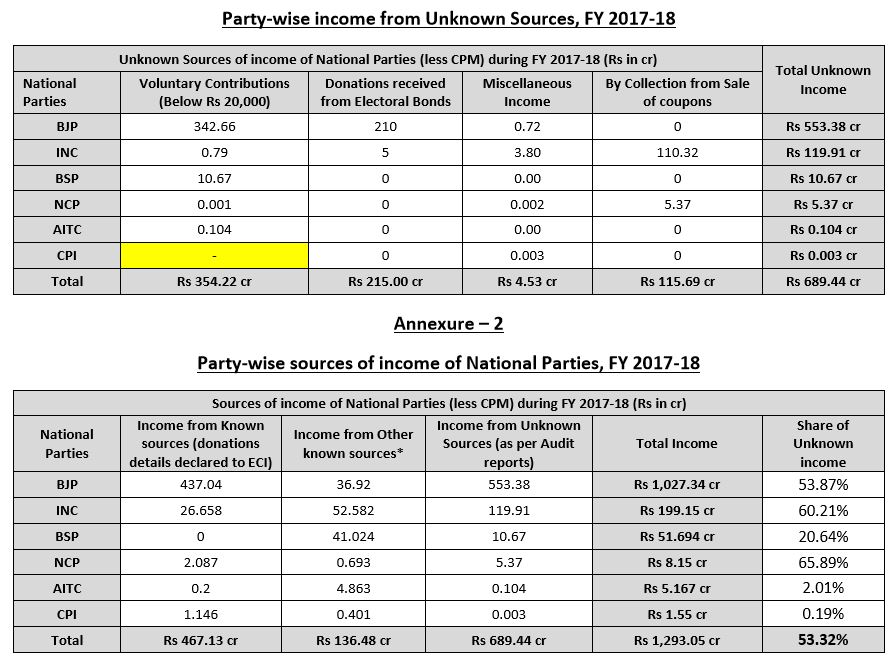On 12th April ,2018 Supreme Court ordered all the political parties must submit details of donations received through Electoral bonds to the Election Commission in a sealed cover before May 30.
Electoral bonds worth Rs 1,1716 crore already sold this year, Rs 1,057 crore in 2018
In its interim order the court effectively declined to order a temporary ban on electoral bond scheme, instead indicating it needs to examine issues at length.
95% of Electoral bonds are given to ruling party


When Finance Minister Arun Jaitley made an announcement of Electoral Bonds as the process of cleansing the political funding and bringing in transparency to the funding received by the political parties. Analysts were optimistic about this move as the government was looking to address the elephant in the room i.e to target the sources of black money which are used for running the election expenses and illegal money in the country. Instead what came out was clean money made to a bank in form of cheque through electoral bond is the anonymity which the donor and political party carried to make a fool of this scheme for the people.
What is an Electoral Bond?
Electoral bonds are monetary instruments that any citizen or body corporate incorporated in India can buy from the State bank of India and give it a political party and who is then free to redeem the bond for money.
It said that bonds do not carry the name of the donor nor the political party’s name and it only had a unique alphanumeric serial number as in built security feature.
The bonds are available in following denomination
The bonds are issued in denominations of Rs 1,000, Rs 10,000, Rs 1 lakh, Rs 10 lakhs, Rs 1 crore.
Only a political party which is registered under the section 29A of Representation of People Act , 1951 and which had secured more than one percent of the votes in last election to Lok Sabha would be eligible.
There have been lot of changes brought in by the government through amendments to provisions in the Income Tax Act, Representation of People Act 1951, Companies Act and the FCRA under the Electoral bond scheme. This changes were done through Finance Act 2017. These changes has led to lack of transparency and loss of trust among people in the very purpose of introducing the bonds.
Earlier the Companies Act 2013 provided for a cap on the contributions made by companies to various political parties to the extent of 7.5% of the net profit of last three financial years. Further the company making such contribution was required to disclose the contribution made along with the details of political party to whom such contribution have been made.
This finance act amends this section of Companies Act 2013 to remove the cap of 7.5% and the requirements of disclosing such contributions made to political parties. This will lead to creation of losing of trust in the electoral process as the companies will make huge amount of donations through shell companies.
The Existing provisions of 13 A Income tax Act inter-alia provides that political parties that are registered with Election Commission of India are exempt from paying income tax. To avail the exemption the political parties are required to submit a report under sub-section(3) of the Section 29C of the Representation of People Act, 1951(43 of1951) furnishing the details of contribution received by political party in excess of Rs 20,000 from any person. However under the existing provisions of the Act there is no restriction of receipt of any amount of donation in cash by political party.
In order to discourage
the cash transaction and bring transparency in the sources of funding to the
political parties it proposed to amend the provisions of 13 A—
No donation of Rs 2,000 or more is received otherwise than by an account payee
cheque drawn on a bank or account payee bank draft or use of electronic
clearing system through bank account or through electoral bonds. Political
party furnishes a return of income for the previous year in accordance with
provisions of sub section (4B) of section 139.
Even with recent amendments Donations below Rs 2,000 can still be received in cash. So the political parties can receive invoices of higher amounts and can manipulate by breaking those higher denominations in to smaller amounts less than Rs 2,000 and still not disclose the report. Further in order to address the condition of anonymity the political parties shall not be required to furnish the names and the address of the donor.
Tax benefit
As per Sections 80GGC/80GGB of the Income Tax Act the contribution made by an individual/company through an electoral bond will be exempt from income tax. Further, the contribution received by any eligible political party in the form of electoral bonds will be exempt from income tax as per Section 13A of the Income Tax act.
Section 29C of Representation of People Act 1951 which deals with declaration of donations received by a political party, has said that every political party who receive funding need to submit a report on excess of amounts of Rs 20,000 to the Election Commission before filling for returns under the Income tax Act. If the party doesn’t report then they can’t claim for exemption from tax.
Impact of Electoral bonds
Corporate funding to
political parties are completely opaque.
No guarantee to tackle the flow of black money.
The very objective of transparency is getting defeated with anonymity in knowing who is contributing how much to whom.
Conclusion
All the political parties
should come under the purview of RTI Act,
Contributions made by the corporations should be made public by the regulators.
The foreign companies through changes in FCRA will try to influence the electoral process and it affects the sanctity of elections.
Bold article in this election season Aditya !!
LikeLike